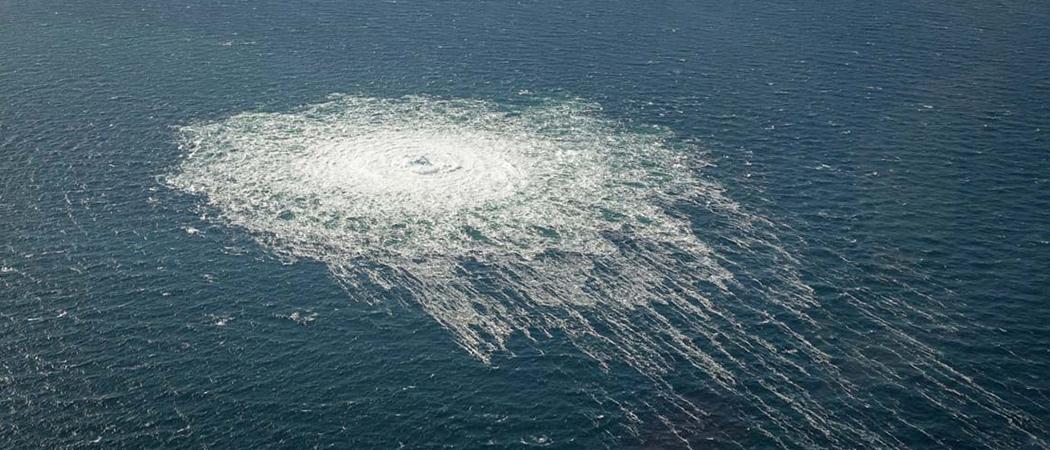As geopolitical shocks reverberate through Europe, policymakers place energy security and strategic autonomy at the top of the research agenda

Europe wants to speed up its transition to alternative energy as Nord Stream gas pipelines rupture in several locations under the Baltic Sea. Photo: Forsvaret.dk
The drafting of the strategic plan setting the direction for the final three years of the EU’s Horizon Europe research programme from 2025 - 2027 is starting this week, the European Commission announced at its R&I Days event.
The plan sets out how European research will be steered to support various social and economic goals. In the first four years of the €95.5 billion Horizon Europe programme these included strategic autonomy, enhancing biodiversity, moving towards a more circular and sustainable economy and creating a more democratic society.
Launching the drafting of the next plan, Mariya Gabriel, commissioner for research and innovation, said these goals will stay at the top of the agenda, but highlighted it is time to review what will stay relevant in the ever-changing and increasingly dramatic geopolitical climate. The essence of the exercise, is “To allow us to question if we are still doing the right things and if our priorities are still the relevant ones.”
Food and energy security, for one, the commissioner noted, may feature higher up in the list of priorities starting from 2025, as the war in Ukraine reveals how quickly access to these basic needs can be cut off.
In a show of the Commission’s broad approach to research programming, Gabriel said that the drafting of the new strategy will be “an inclusive and interactive process.” A three-month public consultation will open in November. “If we want to succeed, we need to make sure the knowledge is shared, the solutions are used in society, and that’s why we need to listen to you [on] how we can reinforce this ambition,” said Gabriel.
In a small-scale survey prior to the event, 43% of respondents named the green transition as the number one priority for the second half of Horizon Europe, 16% pointed to resilient health systems, 13% singled out the digital transition, 8% each picked strategic autonomy and energy as key challenges.
Shorter timeframe for action
The need to accelerate the energy transition was underlined in the early hours of Monday, when the main gas pipeline linking Russia to Germany, Nord Stream 1, started leaking. Since then, three other leaks were discovered in both Nord Stream 1 and 2 pipelines. Governments in the region are pointing to potential sabotage by the Russian army.
Political statements at the Commission’s research and innovation event on Wednesday underscored the urgency of Europe’s energy transition. “Europe is under immense pressure,” said Bettina Stark-Watzinger, Germany’s education and research minister. “We need to become leaders in climate neutrality.”
Roberta Metsola, the president of the European Parliament, said citizens are putting on more pressure and demanding the EU does more to ensure greener and more reliable sources of energy. Over the past two and a half years, EU politics revolved around how innovation in the digital and climate sectors would help the bloc pay for the economic toll of the COVID-19 pandemic in the medium and long term. But the war in Ukraine and the energy crisis have shortened the time frame for action.
“Whether we're talking about how we are going to uncouple from our dependence on Russia, then we need innovation, we need to be able to invest in renewables faster,” said Metsola. “We need to make sure that our funding structures are easily more easily accessible, but we need to research quicker and invest.”
Geopolitics drive research
Speaking at the launch of the strategic plan drafting, Cristian Bușoi, head of the European Parliament’s industry, research and energy committee ITRE, agreed the green transition should remain at the top of the agenda, with a strong focus on meeting the EU’s energy needs. He highlighted modernising of the energy grid, hydrogen as an energy source and carbon capture and storage, as key areas in need of R&I investment.
Bușoi pointed to resilience as an answer to the EU’s geopolitical challenges, as it deals with fallout from the pandemic, economic uncertainty, climate goals, the accelerating energy crisis and the war in Ukraine. “We overcome all these challenges by being resilient, and I believe that the strategic plan for Horizon should be about this,” said Bușoi.
Strategic autonomy is set to remain at the top of the agenda, as the EU tries to figure out who its friends and foes are in a fragmented global market.
“Taking into account the systemic shocks, we must strengthen the resilience of the EU while enforcing the security and open strategic autonomy of Europe,” said Radka Wildová, deputy minister for higher education, science and research in the Czech Republic. “We feel more than ever before the need for a faster green energy transition and the diversification of our key supply chains in digital technologies while supporting our technological sovereignty.”
Wildová highlighted the need to choose international partners carefully, to ensure reciprocity and respect for European values, and to protect the European Research Area from foreign interference. There has been some progress in this respect, she noted. “But I have to stress we have to go even farther. We should take the current situation as [an] impulse to be more determined in protecting European research and innovation in strategic areas, such as cybersecurity, climate change, space or energy, just to name a few.”





 A unique international forum for public research organisations and companies to connect their external engagement with strategic interests around their R&D system.
A unique international forum for public research organisations and companies to connect their external engagement with strategic interests around their R&D system.